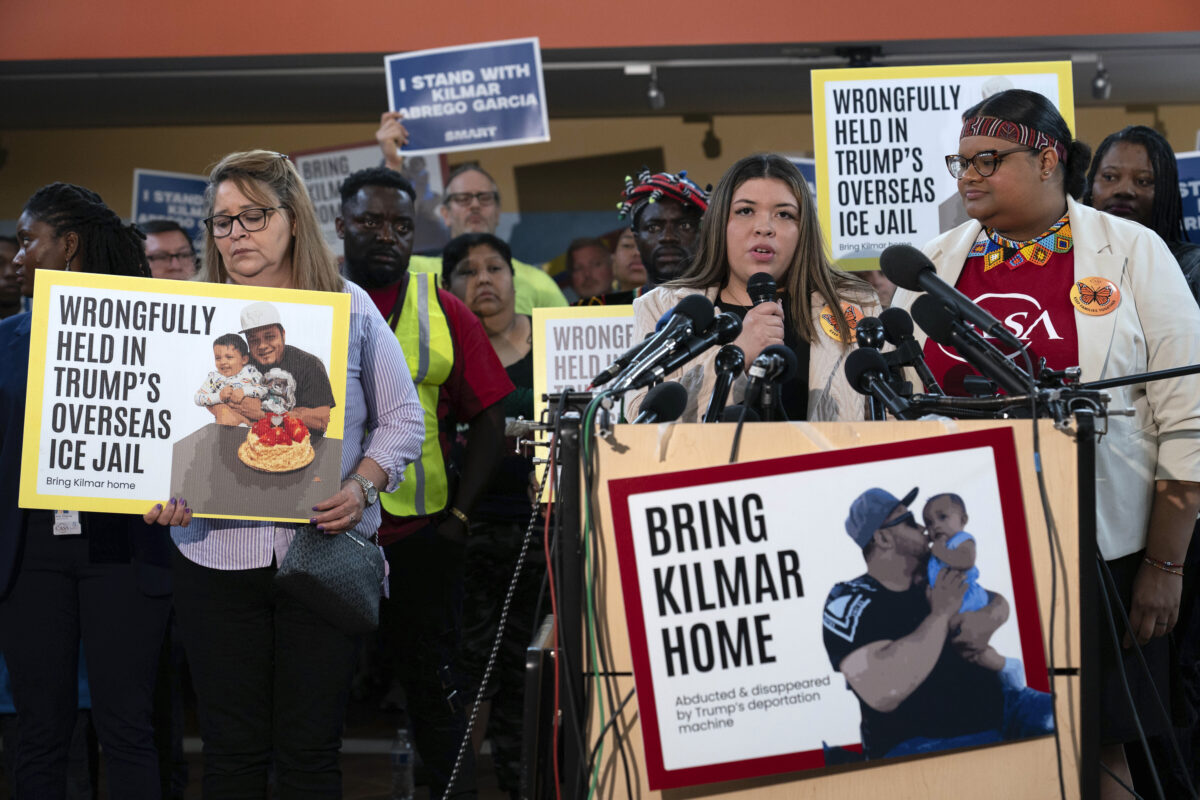‘Cancel Vacations’: Irritated Judge Orders Trump DOJ Lawyers to Clear Their Schedules for Two-Week Inquiry in Abrego Garcia Case

AP Photo/Jose Luis Magana.
U.S. District Court Judge Paula Xinis ran out of patience with attorneys in President Donald Trump’s Department of Justice at a hearing Tuesday regarding the deportation of Kilmar Abrego Garcia and his imprisonment in an El Salvadoran prison, eviscerating their efforts to redefine the word “facilitate” from a Supreme Court ruling and instructing them to “cancel vacations” to comply with a two-week inquiry into the matter.
Abrego Garcia, an immigrant from El Salvador, came to the U.S. illegally as a minor around 2011. His legal team have said he was fleeing gang violence. He was living in Maryland with his wife and three children, all of whom are U.S. citizens when he was arrested in March. He was sent to the Centro de Confinamiento del Terrorismo, abbreviated CECOT, a notorious maximum security prison in Tecoluca established by El Salvador’s President Nayib Bukele that is well-documented to be a cesspool of human rights abuses. In multiple court filings, at least three separate Trump administration officials have conceded that Abrego Garcia had been mistakenly deported because of an “administrative error.”
Xinis ordered the administration to arrange his return. The Supreme Court’s ruling asked the judge to clarify some points but essentially upheld it, instructing the Trump administration to “facilitate” Abrego Garcia’s release and return to the U.S.
Nonetheless, the White House has continued to insist that Abrego Garcia’s arrest, deportation, and imprisonment were justified, by calling him a gang member and “terrorist,” and claiming that the U.S. is powerless to get him back from CECOT. There is no evidence of Abrego Garcia being a gang member or terrorist. He has never been convicted or even charged with such crimes or affiliations — or any crime, period. The government’s “proof” he was in MS-13 is limited to wearing Chicago Bulls attire and one questionable claim by a confidential informant police officer who was suspended just weeks later for “serious professional misconduct” and pled guilty.
Politico senior legal affairs reporter Kyle Cheney reported on Tuesday’s hearing, chronicling the judge’s irritation with the DOJ attorneys’ lack of not just progress, but responsive answers to the court.
“To date, what the record shows is that nothing has been done,” said Xinis. “Nothing.”
She added that the court would have “no tolerance for gamesmanship or grandstanding” to thwart getting the answers it sought, and scolded the lawyers to clear their schedules. “We’re going to move…There are no business hours while we do this…Cancel vacations, cancel other appointments. I’m usually pretty good about things like that in my court, but not this time. So, I expect all hands on deck.”
To remedy the feds’ foot-dragging, Xinis ordered what she described as an “intense” two-week expedited discovery schedule that named four senior officials with the Department of Homeland Security and the Department of State to sit for depositions by next Wednesday, April 23.
The judge’s order also granted Abrego Garcia’s attorneys the ability to subpoena documents, send interrogatory requests, and subpoena up to two additional people, for the purpose of collecting “evidence concerning: (1) the current physical location and custodial status of Abrego Garcia; (2) what steps, if any, Defendants have taken to facilitate Abrego Garcia’s immediate return to the United States; and (3) what additional steps Defendants will take, and when, to facilitate his return.”
A sharply-worded section of the order eviscerated the DOJ’s arguments quibbling with the plain English definition of “facilitate” from the Supreme Court ruling as running “contrary to law and logic” (citations omitted):
Notably, to “facilitate” means “to make the occurrence of (something) easier; to render less difficult.” Merriam-Webster defines the term as “to make easier or less difficult: to free from difficulty or impediment.” And the Oxford English Dictionary defines “facilitate” as “[t]o assist (a person); to enable or allow (a person) to do something, achieve a particular result, etc., more easily.” Defendants therefore remain obligated, at a minimum, to take the steps available to them toward aiding, assisting, or making easier Abrego Garcia’s release from custody in El Salvador and resuming his status quo ante. But the record reflects that Defendants have done nothing at all.
Instead, the Defendants obliquely suggest that “facilitate” is limited to “taking all available steps to remove any domestic obstacles that would otherwise impede the alien’s ability to return here.” The fallacy in the Defendants’ argument is twofold. First, in the “immigration context” as it were, facilitating return of those wrongly deported can and has included more extensive governmental efforts, endorsed in prior precedent and DHS publications. Thus, the Court cannot credit that “facilitating” the ordered relief is as limited as Defendants suggest.
Second, and more fundamentally, Defendants appear to have done nothing to aid in Abrego Garcia’s release from custody and return to the United States to “ensure that his case is handled as it would have been” but for Defendants’ wrongful expulsion of him. Thus, Defendants’ attempt to skirt this issue by redefining “facilitate” runs contrary to law and logic.




